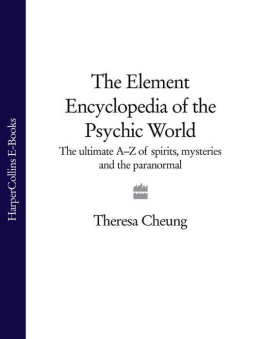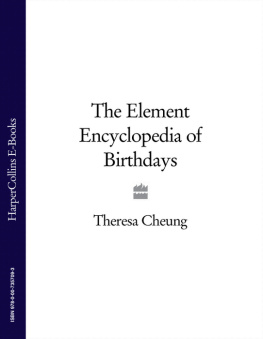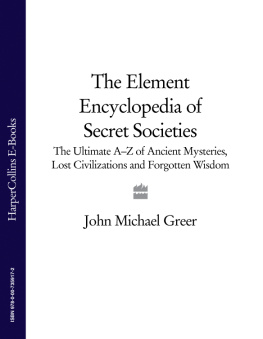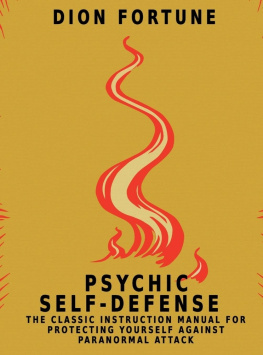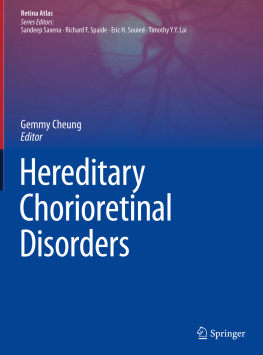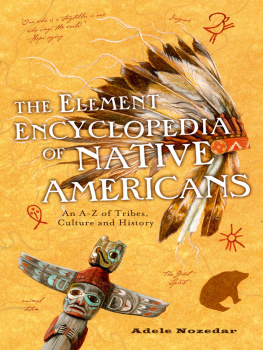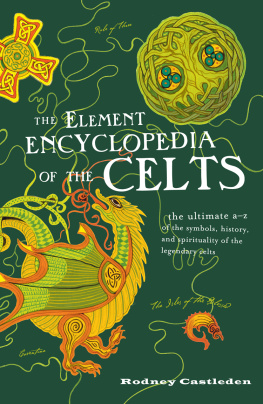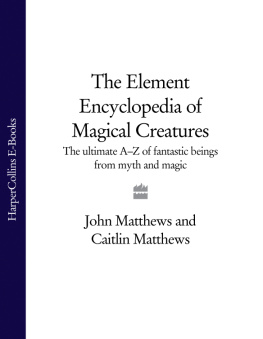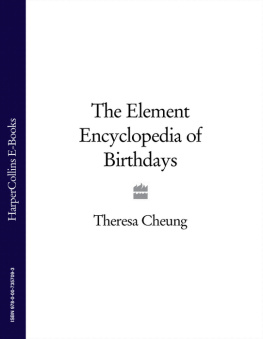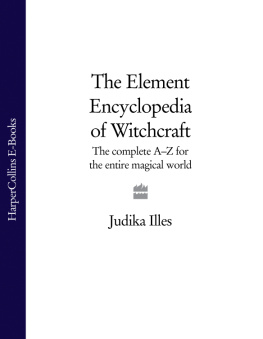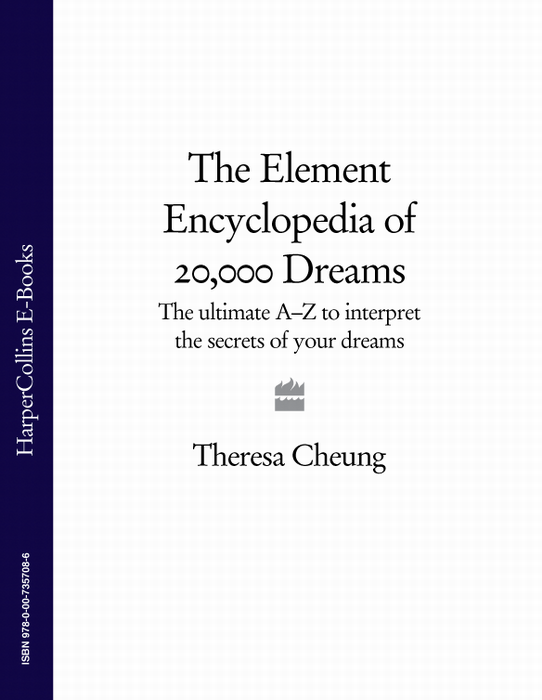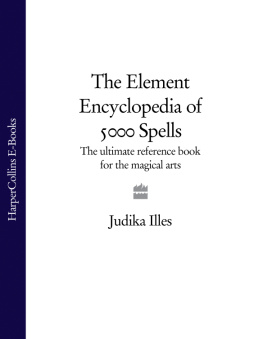Cheung - The Element Encyclopedia of the Psychic World
Here you can read online Cheung - The Element Encyclopedia of the Psychic World full text of the book (entire story) in english for free. Download pdf and epub, get meaning, cover and reviews about this ebook. year: 2010, publisher: Harper Element, genre: Religion. Description of the work, (preface) as well as reviews are available. Best literature library LitArk.com created for fans of good reading and offers a wide selection of genres:
Romance novel
Science fiction
Adventure
Detective
Science
History
Home and family
Prose
Art
Politics
Computer
Non-fiction
Religion
Business
Children
Humor
Choose a favorite category and find really read worthwhile books. Enjoy immersion in the world of imagination, feel the emotions of the characters or learn something new for yourself, make an fascinating discovery.
The Element Encyclopedia of the Psychic World: summary, description and annotation
We offer to read an annotation, description, summary or preface (depends on what the author of the book "The Element Encyclopedia of the Psychic World" wrote himself). If you haven't found the necessary information about the book — write in the comments, we will try to find it.
Cheung: author's other books
Who wrote The Element Encyclopedia of the Psychic World? Find out the surname, the name of the author of the book and a list of all author's works by series.
The Element Encyclopedia of the Psychic World — read online for free the complete book (whole text) full work
Below is the text of the book, divided by pages. System saving the place of the last page read, allows you to conveniently read the book "The Element Encyclopedia of the Psychic World" online for free, without having to search again every time where you left off. Put a bookmark, and you can go to the page where you finished reading at any time.
Font size:
Interval:
Bookmark:
A mind that is stretched by a new experience can never go back to its old dimensions.
(Oliver Wendell Holmes)
In the last few decades interest in the psychic world has escalated. Beyond the basic Steven King novel, the idea of being psychic or having psychic abilities has penetrated deeply into mainstream culture.
The movie Ghost (1990), with Whoopie Goldberg as reluctant medium Oda May Brown, was the first blockbuster film to portray psychic phenomena in a positive light. Since then a steady stream of books, films and documentaries has followed. Organizations, seminars, workshops, websites, study programmes, chat rooms and courses in parapsychology (the study of the paranormal or unexplained) and psychic development have sprung up over night. Doctors and researchers in holistic health are assembling a startling body of evidence for the interconnectedness of mind, body and spirit. We can now speak openly about alternative healings, meditative and psychic experiences without fear of ridicule.
Yet despite all the attention currently being given to psychic phenomena, their true nature still lies deeply shrouded in mystery. One of our favourite ways for dealing with the unknown is through language. We assign a word to an experience, to something we want to describe, and then we feel we have a handle on it. So lets try to get a grasp on this great unknown, the universe of psychic phenomena, by assigning words to it.
To begin with, what do we mean by psychic? The word psychic describes anything in connection with the psyche. Psyche dates back to ancient times when a goddess by the name of Psyche was thought to be in charge of the invisible but essential part of human existence. Over time the word and its meaning evolved, and today a Thesaurus offers the following synonyms: mind, soul, self, subconscious, spirit, subliminal self, inner self, awareness, ego and individuality. Today we use the word psyche to refer generically to all kinds of phenomena, experiences or events that seem to be related to the invisible mind, internal body sensations and altered states of consciousness, which cannot be explained by established physical principles.
To qualify as psychic, an experience must therefore involve interactions that are qualitatively different from our normal, physical ways of exchanging with the world (e.g. verbal and nonverbal communication, sensations and bodily movements). A genuine psychic experience cannot be based even upon the most subtle, subliminal forms of perception or action.
As the experience is different for every person it is impossible to explain exactly what the psychic state is, but a large number of experiences are considered psychic. These include telepathy (mind reading), clairvoyance (psychic ability to see objects and visions), psychokinesis (mind-over-matter), psychic healing, out-of-body experiences, poltergeists, spirits and hauntings. Within the pages of this Encyclopedia youll find a veritable compendium of all aspects of psychic phenomena - what they are, the evidence for them, the theories which have been proposed, the dynamics which favour or suppress them, and the techniques for discovering them in yourself. You will also find biographies of famous mediums and key figures in the psychic world as well as information about divination methods, well-known hauntings and paranormal beliefs from all over the world. The aim isnt to explain the unexplainable - as that is impossible - but to lift the veil and make the groping for words easier when it comes to researching, questioning and understanding the mysteries of the psychic world.
Psychic traditions have existed since the beginning of recorded history and have been present in one way or another in ancient cultures all over the world. It seems that a belief in ghosts and communication with spirits of the dead has also always been with us from our earliest beginnings.
In the ancient Middle East, psychic powers were practised by prophets and are described in the Bibles Old Testament. The royalty of many ancient cultures used divination to seek guidance in times of war and to predict natural disasters such as drought. The Egyptians believed they could communicate with the dead and forecast future events using palmistry and dream divination. In Africa the ancient peoples used trance states to contact the spirits of their dead ancestors. The Greeks used oracles at sacred locations to give prophecies of the future and the Romans looked to the stars for messages from the invisible realm. Early American psychic practices have also been documented. The Aztecs in Mexico used astrology and oracles and Native Americans relied on advice given to them by shamans who entered deep trance-like states to contact spirits.
Although belief in ghosts was present from the very beginning of human history, the first extant report of a haunted house comes from a letter written by a Roman orator called Pliny the Younger (AD 61-112). He wrote to his patron, Lucias Sura, about a villa in Athens that nobody would rent because of a resident ghost.
The best-known psychic of the Middle Ages was a French physician called Nostradamus (1503-1566). He wrote about a thousand prophetic verses, which are still analysed today by scholars looking for references to the worlds future.
After the Middle Ages and the Renaissance, during the Age of Reason, belief in psychic powers and the paranormal waned, but it was reborn again with the help of the Spiritualist movement. The foundations of spiritualism were laid by Emanuel Swedenborg (1688-1772), who allegedly went into trances and communicated with the dead. However, it was the Fox sisters, Kate (1841-1892) and Margaretta (1838-1893), who really brought psychic phenomena to the forefront. The sisters claimed they were able to manifest spirit communication through the rappings of a peddler who had been murdered and found in the Fox home. The public were fascinated as the sisters gave public demonstrations of this psychic manifestation throughout the United States.
Even though the sisters later confessed to fraud, the Spiritualist movement was by then well underway both in the United States and in Europe. Spirit rapping gave way to sances, table-tilting, trance writing and spirit communication through a medium. Many of these techniques are still practised today by Spiritualist churches.
Perhaps the biggest influence on the advancement of psychic knowledge was that of a man called Edgar Cayce (1877-1945), who is now considered the founder of the so-called New Age movement. Cayce had remarkable psychic powers. Allegedly he could see into the future and give predictions. He could look through objects and inside the human body. He was also able to enter another persons mind and know what that person was thinking, and sleep on a book and remember its contents.
The phenomena produced by mediums and psychics like Cayce during the height of spiritualism in the latter part of the nineteenth century quickly attracted the attention of eminent scientists and intellectuals, and the scientific investigation of alleged psychic powers, ghosts, apparitions, poltergeists and paranormal phenomena began in earnest. In 1882 the Society for Psychical Research was formed in London, and in 1885 the American Society for Psychical Research was founded in Boston. Clubs, organizations and societies dedicated to the paranormal sprung up all over the world, and as the twentieth century drew to a close the psychic world had successfully filtered into mainstream culture. It looks set to stay there.
Today we have televised sances and ghost investigations, celebrity mediums and psychics and bookshops, websites and university courses devoted to the paranormal. Over the years investigation of the paranormal has become increasingly sophisticated and precise. It isnt about superstition and eye-witness accounts any more, but about laboratory experiments, data, theories, statistical evaluation and high technology. There are those who are keen to offer theories to prove we live in a psychic world and those who are convinced it doesnt exist. There is a huge desire to unravel the mystery. The hotly debated question at the beginning of the twenty-first century is, are psychic phenomena real?
Font size:
Interval:
Bookmark:
Similar books «The Element Encyclopedia of the Psychic World»
Look at similar books to The Element Encyclopedia of the Psychic World. We have selected literature similar in name and meaning in the hope of providing readers with more options to find new, interesting, not yet read works.
Discussion, reviews of the book The Element Encyclopedia of the Psychic World and just readers' own opinions. Leave your comments, write what you think about the work, its meaning or the main characters. Specify what exactly you liked and what you didn't like, and why you think so.

